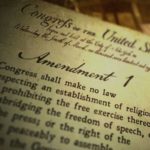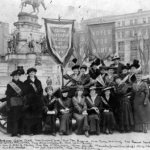This lesson plan is based on the Annenberg Classroom video “Freedom of the Press: New York Times v. U.S.,” which explores the First Amendment’s protection of a free press as well as the historic origins of this right and the ramifications of the landmark ruling in the Pentagon Papers case in which the Supreme Court ruled that prior restraint is unconstitutional.
Freedom of the Press: New York Times v. United States

This documentary examines the First Amendment’s protection of a free press as well as the historic origins of this right and the ramifications of the landmark ruling in New York Times v. United States in which the Supreme Court that prior restraint is unconstitutional. The federal government could not prevent newspapers from publishing the Pentagon Papers. A lesson plan, Defenders of Liberty: The People and the Press, accompanies the video.
19th Amendment: Part 1 Podcast
The prominent figures and events of the women’s suffrage movement of the 19th and 20th centuries can feel almost mythical at times. That’s in part because they are, in fact, myths. The telling of the Nineteenth Amendment tends to stretch from a convention in Seneca Falls, New York, in 1848 to the amendment’s ratification in 1920, but the true story is a much longer one. We explore the myths and unveil the realities in part one of two episodes on the Nineteenth Amendment. Our guests are historians Martha Jones of John Hopkins University, Laura Free of Hobart and William Smith Colleges, and Lisa Tetrault of Carnegie Mellon University.
This short episode includes a one-page Graphic Organizer for students to take notes on while listening, as well as discussion questions on the back side.
Landmark Supreme Court Cases – Freedom of the Press
From the first days of American history until today, the Supreme Court has been pivotal in interpreting the Constitution and shaping America’s constitutional republic. Read summaries of the majority ruling in landmark Supreme Court cases that have had an impact on our rights as citizens.
Women’s Suffrage and Equal Rights: Lesson Plans and Resources

On August 18, 1920, the 19th Amendment to the United State Constitution was ratified, thus granting women the right to vote. The ratification of this amendment was a result of the powerful, unwavering momentum of hundreds of women who first convened a women’s rights convention in Seneca Falls, New York. This collection provides free lessons that will help students learn more about this important time in history, highlighting important developments in not only Women’s Rights, but U.S. Civil Rights and other amendments to the Constitution.
The Pursuit of Justice
The Pursuit of Justice book, written by Kermit L. Hall and John J. Patrick, analyzes 30 Supreme Court cases chosen by a group of Supreme Court justices and leading civics educators as the most important for American citizens to understand. An additional 100 significant cases included in state history and civics standards are summarized. The complete book or individuals chapters can be downloaded.
Free Press and SCOTUS: Incorporating Case Studies in the Classroom
This lesson will ask students to engage with landmark freedom of press case studies exploring how the Supreme Court has ruled on First Amendment issues and has tried to balance competing values in our democracy.